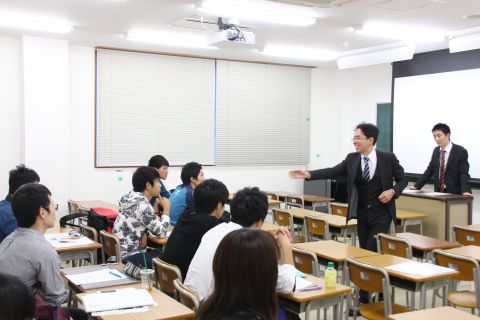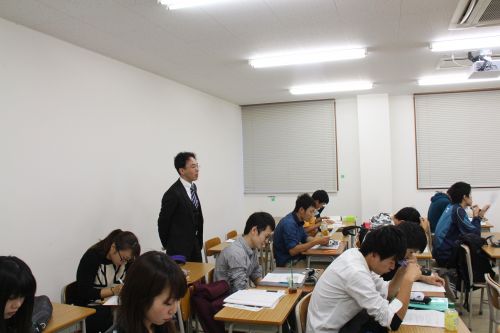TSUKUBA FUTURE
#048 Law Studies Can Be Cool?
Associate Professor TSUJI Yuichiro, Faculty of Humanities and Social Sciences

Unconstitutionality is an issue being discussed today as it pertains to numerous important issues in Japanese society, including: national security legislation, the rights of husbands and wives retaining separate family names, and the disparity in values of votes among different constituencies. Books and other publications that address constitutionality issues sell well, indicating strong public interest. Or sales may simply indicate that Japan's constitution is on people's minds but does not directly impact their lives. With the spread of Internet use, interpretations of the law have been changing dramatically. And at the university, lectures on the constitution are attended by students who may not necessarily have their sights set on becoming lawyers.
Few people are likely to be able to respond immediately when asked how cosplay (short for "costume play") relates to the Japanese constitution. But Prof. Tsuji speaks eloquently on the topic as it relates to freedom of expression. This unique blend of integrity and wit makes his classes quite popular.
Prof. Tsuji first began exploring this topic when asked to give a lecture on the theme at an international conference in Taiwan to which he was invited to discuss "the rights of derivative works". Although he had prepared well on his chosen topic, somehow the general conference theme had been enlarged to include and even center on intellectual property rights, and the other presentations involved stiff discussions of legal issues. Despite feeling like a fish out of water, he did his best speaking about "Cool Japan" using the example of cosplay to illustrate his point. There is nothing in Japanese law that prevents a person from stitching together a costume to imitate a character from an anime, and even accessorize. This kind of activity is protected by law as "freedom of expression". However, cosplay has grown into an industry as the Internet has facilitated the participation of a great many people and brought together small clubs of like-minded enthusiasts. Many kinds of related merchandise are sold in quantity to the general public, generating huge profits.
This phenomenon is also connected to the issue of physically scanning books or other works to create digitized versions, a copyright-skirting process known in Japan as jisui. If a person does this at home for personal use, it breaks no laws, but when it becomes a "business" where the scanned work is distributed to the public for profit, intellectual property-related issues arise, although Japanese law as legislated does not offer sufficient coverage for such contingencies.
So, the question becomes how far does "personal use" extend, and how should that right be protected? Prof. Tsuji cites the start of Apple Computer by Steve Jobs as an example here. Jobs started out by making and assembling computers with friends in a small garage. This was much the same as cosplay and jisui, according to Prof. Tsuji. The situation was similar for Bill Gates. But after those operations grew into major corporations, those entities even began attempting to control the Internet as a platform for earning profits. A small number of people hand-soldering circuit boards in a garage grows into a global giant of industry. Large corporations try to get laws passed that smother not only tiny personal efforts but venture businesses, as well. The legal conflict is between the rights enjoyed by individuals and observing copyrights.
With the rapid development of electronic media and tools, the laws cannot keep up. To try to solve problems, existing laws are interpreted by referencing court precedents. Suppose there is a rule that horse-drawn carriages are prohibited on a certain bridge—would it be alright for other types of vehicles to cross? What would be the harmful effects of limiting the use of drones? What would be the legal interpretation of following a suspect's car using GPS without a search warrant? Prof. Tsuji asks his students such questions in his classes.
Basic human rights—the cherished dignity of the individual—are a universal value across the globe. The fact that countries have different constitutions is attributable to different means to achieve an objective.

Prof. Tsuji's gesticulations encourage students to join in the discussion during a student presentation.
After completing graduate school in Japan, Prof. Tsuji enrolled in graduate school at the University of California, Berkeley. The many examples of West Coast IT venturesand international constitutional comparisons that he is able to reference at the drop of a hat can be attributed to this background.
The supreme court is the watchdog of the constitution. However, the stance of their respective supreme courts differs in the United States and Japan. In both countries, a whistle-blowing party must first take a case to trial before a decision on constitutionality can be issued. However, in Japan, there have been extremely few cases where unconstitutionality has been determined by the Supreme Court since the Japanese constitution was first enacted, differing considerably from the United States.

Prof. Tsuji teaches students not to trust unthinkingly in authority.
As a high school student, Prof. Tsuji was somehow attracted by the ring of the word "law" and went on to study law at university. Today, as a constitutional scholar, he is dynamic in promoting intricate discussion of constitutional law in Japan. He brings up topics ranging from climate change to cosplay to book scanning—areas which might be considered unconventional by standard approaches to constitutional law—because he wants young people to know that the constitution, in actuality, does affect people's lives directly. Prof. Tsuji also has future plans to expand his research themes to cover political corruption.
The Internet makes it possible for an individual who is unable to make his or her point alone to find like-minded people and exercise influence as a group. At the same time, when only like-minded people gather together, opinions can galvanize and form into extremist group—a well-known phenomenon. Tolerance toward views that one cannot fully accept is the basis for freedom in society. Freedom of expression means mediating a dialogue, trying to persuade rather than threatening or interfering with people who hold a contrasting opinion. Prof. Tsuji hopes that by making it easy for the public to exchange opinions on constitutional court judgments, the courts will also stop handing down halfway decisions on matters of unconstitutionality.
Article by Science Communicator at the Office of Public Relations


